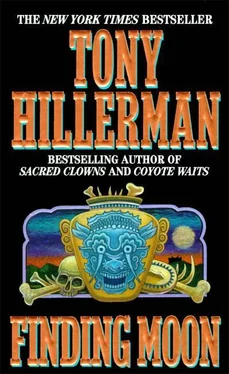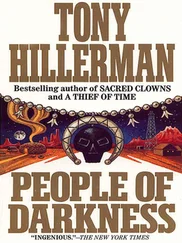Tony Hillerman - Finding Moon
Здесь есть возможность читать онлайн «Tony Hillerman - Finding Moon» весь текст электронной книги совершенно бесплатно (целиком полную версию без сокращений). В некоторых случаях можно слушать аудио, скачать через торрент в формате fb2 и присутствует краткое содержание. Жанр: Триллер, на английском языке. Описание произведения, (предисловие) а так же отзывы посетителей доступны на портале библиотеки ЛибКат.
- Название:Finding Moon
- Автор:
- Жанр:
- Год:неизвестен
- ISBN:нет данных
- Рейтинг книги:4 / 5. Голосов: 1
-
Избранное:Добавить в избранное
- Отзывы:
-
Ваша оценка:
- 80
- 1
- 2
- 3
- 4
- 5
Finding Moon: краткое содержание, описание и аннотация
Предлагаем к чтению аннотацию, описание, краткое содержание или предисловие (зависит от того, что написал сам автор книги «Finding Moon»). Если вы не нашли необходимую информацию о книге — напишите в комментариях, мы постараемся отыскать её.
Finding Moon — читать онлайн бесплатно полную книгу (весь текст) целиком
Ниже представлен текст книги, разбитый по страницам. Система сохранения места последней прочитанной страницы, позволяет с удобством читать онлайн бесплатно книгу «Finding Moon», без необходимости каждый раз заново искать на чём Вы остановились. Поставьте закладку, и сможете в любой момент перейти на страницу, на которой закончили чтение.
Интервал:
Закладка:
Moon did not want to think about how the hell they were going to get out of this mess.
By twisting his head, Moon could peer through a narrow space between the sacks and observe a little of the outside world. The most interesting thing he could see was the bottom two-thirds of the Vietcong standing beside the pile of bales across the warehouse. This person wore the traditional VC attire-loose black trousers. His were torn at one knee, wet, and muddy. He sat on one of the bales, rested a U.S. Army-issue M16 rifle against it, balanced a small bowl on his left knee, and began eating from it with his fingers. Now Moon could see almost all of this fellow. By leaning far forward and pulling down on the burlap of the bag in front of him, Moon could also see another black-clad leg. The man with the bowl was old and frail with a kindly face and a ragged mustache that he brushed aside to insert a little ball of rice into his mouth. His hair was short, in what Victoria Mathias had called a “bowl haircut” when she administered them to her sons.
What would this old rice fanner do if Moon pushed back the sack, emerged, and introduced himself? Any impulse Moon might have had to find out died. The man turned his face toward the owner of the leg sitting beside him, revealing that most of his right ear was missing. The area was pink and rough, and from it toward the corner of the old man’s mouth ran a series of round, puckered scars. Cigarettes held against the skin, Moon thought.
The old man stopped eating and began talking. He evoked a response. A woman’s voice responded.
The old man produced a clasp knife from his pants, unfolded it, cut a small slit in the sack, and extracted a palmful of brown rice kernels. He showed these to someone, said something, and laughed.
Moon felt a poke in the back: Mr. Lum Lee signaling for attention. Mr. Lee pointed to his own ear to indicate listening. Of course, Moon thought. Mr. Lee was Vietnamese. He’d understand. Moon pressed back against the sacks to allow Lee to squeeze his small, bony frame past him.
The motion produced a fresh flood of perspiration, which dripped from his eyebrows, his nose, and his chin and ran down his back and his chest. His hair was wet with it and had been since long before dawn. When they left the blue water of the sea and entered the brown water of the Mekong they had sailed into a kind of heavy humid heat Moon had never known.
“You must take a lot of water,” Mr. Lee had told him as they left Glory of the Sea. “You’re big. You will sweat. You must drink more water and take salt too.” They had loaded four fuel cans of water onto the shore boat, and Moon had been drinking like a camel all day. Still he felt a ferocious thirst.
He glanced at Osa. She sat head down, eyes closed, the face of a person enduring. Even in the dim light filtering in between sacks and the warehouse wall he could see her face was glistening with sweat. He tapped her knee, produced what he hoped was a reassuring grin, and received a faint smile in return.
The sound of a shout reached him, then more shouting, followed by laughter. Something clattered.
Then a voice very, very close said something loud. Then came a long discourse in a loud, commanding voice. The sound of an order barked out just above them. Moon held his breath. He gripped Osa’s knee. More voices, distant now. Then a dragging, scraping sound. Then silence.
Moon exhaled. Released Osa’s knee. Looked at Lum Lee. Mr. Lee signaled silence. They listened. Nothing. Perspiration ran from Moon’s eyebrow to the corner of his eye, causing it to sting. A bead of sweat dropped from his nose and was replaced by another. Heat and silence surrounded them.
“They are gone,” Mr. Lee said.
Mr. Lee was right. The dragging, scraping sound they’d heard had been produced by the Vietcong closing the sliding warehouse door behind them. Moon slid it open an inch and peered out. The muddy yard was empty of people. The APC stood at the hangar entrance, shiny with rainwater. Also shiny with rainwater was the copter landing pad, reminding Moon that George Rice had flown away with their only hope of getting out of here. He pushed the door open another inch, his fingers touching paper tacked to its outside surface.
He detached it. It was handwritten with a felt-tipped marker pen in a language strange to Moon. He handed it to Lum Lee.
“Ah,” Lee said. “This warehouse, the rice it contains, and all its other contents are taken into the custody of the Revolutionary Committee of An Loc. Any trespass or theft will be subject to punishment by the court of the people.”
“Right,” Moon said. “What were they talking about before they left?”
Lee nodded, opened his mouth to respond, and then sat suddenly on one of the sacks. He was gray with exhaustion. Osa put her hand on his shoulder. “You are not well?” she said.
“Tired,” Lee said. “Just tired.” He looked up at Moon. “At first the man who had been tortured- the man with the ear sliced off and the burned face-he was telling the woman the mistakes they had made in getting here too late to capture the helicopter. He said the helicopter might be useful to the Yellow Tiger Battalion in holding a bridge somewhere upriver. But he said he thought the puppet soldiers who took it would use it to run away from the fight.” He offered Moon a weak smile. “I think he is absolutely correct.”
“So do I,” Moon said. “Is that why they were laughing?”
“They opened some of the bales,” Mr. Lee said. “One of them had opium balls buried in the copra.”
Moon exhaled. “Opium,” he said.
“In the raw form,” Mr. Lee said. “They tap the poppies in Burma. In the mountains. Boil it down into tar and roll it into balls. Then they wrap the balls in cloth and move it down into Cambodia. Then it is either-”
Mr. Lee became aware of Moon’s expression. He stood silent a moment, cleared his throat.
“I believe Mr. Rice told us that this warehouse was owned by an ARVN general,” Mr. Lee said.
“Yes,” Moon said. “That’s what Rice told us. What else did you hear?”
“A little bit later several people came in,” Mr. Lee continued. “A woman speaking now. She told the old man that they had heard on the Saigon radio that the Americans were evacuating their embassy building in Saigon. They talked about a big mob of city people, the ones who had helped the Americans, fighting each other and trying to get into the embassy grounds and the American marines keeping them away, and helicopters flying in and landing on the roof and flying away with the Americans.”
“The fat lady sang,” Moon said.
Mr. Lee stared at him.
“It’s an American saying,” Moon said. “It means something is finished. We say, It ain’t over till it’s over. Now I guess it’s over.”
“I see,” Mr. Lee said.
“I had been thinking maybe we could find a way to go north. Find a way to slip into Saigon and get to the embassy. So much for that. Not a good idea now.”
“It was not a good idea ever,” Mr. Lee agreed. “I think what’s left of the Army of the Republic of Vietnam will be pulling back to Saigon, and the North Vietnam army and the Vietcong units will be moving there too. Gathering in close now, I think, for the last big battle.”
“I think so too,” Moon said. “And I don’t have any other ideas. Not even bad ones.” He used the back of his hand to wipe away the perspiration dripping from his eyebrows. “Did you hear anything else?”
“The man with the scarred face asked someone if he had completed an inventory of what was here, and they talked of how many sacks of rice, and sandalwood, and charcoal, and barrels of gasoline and diesel fuel. And what was in the kitchen and the bathroom. And a pistol found in the office was mentioned, and handed to the old man. Then someone who must have been out at the hangars came in and told the old man that Big Minh, the new puppet president at Saigon, was broadcasting a speech. He was telling the puppet army-”
Читать дальшеИнтервал:
Закладка:
Похожие книги на «Finding Moon»
Представляем Вашему вниманию похожие книги на «Finding Moon» списком для выбора. Мы отобрали схожую по названию и смыслу литературу в надежде предоставить читателям больше вариантов отыскать новые, интересные, ещё непрочитанные произведения.
Обсуждение, отзывы о книге «Finding Moon» и просто собственные мнения читателей. Оставьте ваши комментарии, напишите, что Вы думаете о произведении, его смысле или главных героях. Укажите что конкретно понравилось, а что нет, и почему Вы так считаете.












